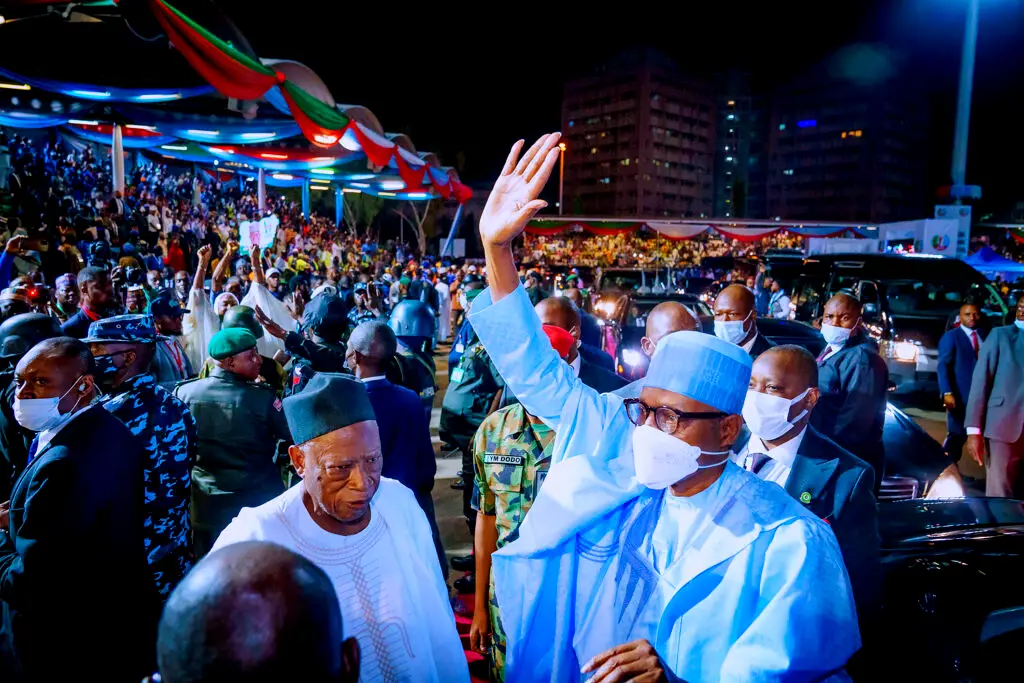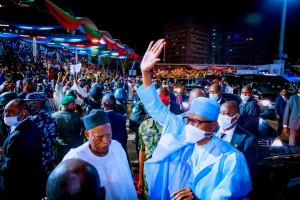
At the beginning of the final full year of his administration, President Muhammadu Buhari had in one of the interviews he granted Channels Television in January 2022 said that he had a preferred successor whose identity he would safeguard to protect such from political or physical harm.
Buhari with the air of an authoritative leader who knew where he was going had said he had a potential successor whose identity would remain a secret.
“No, I wouldn’t say because he may be eliminated if I mention. I better keep it,” the President stated in the interview aired on January 5, 2022.
However, as the nation progressed, the president appeared to demur in May when after the Eid-el-fitr prayers he told reporters that he had no preferred successor.
His assertion of a lack of a succession agenda in the consideration of many was in keeping with diplomatic and political culture. After all, no leader would be expected to show forth his hand even before the beginning of the game.
Whatever, the general inclination was that the president and those who form the powerful cabal around him were not inclined to some particular persons as a successor.
Among those severally mentioned were Asiwaju Bola Tinubu and his protegee, Vice President Yemi Osinbajo.
Multiple reasons were speculated for the opposition to Tinubu. However, no evidence was produced by his opponents to back their claims against the former Lagos State governor.
Indeed, a powerful cabinet member from the Northwest was known to have for about two years up till recently held monthly meetings with selected powerful political actors with a representative from each state of the country with the single aim to stop Tinubu.
Vice-President Osinbajo was also not reckoned with essentially because of actions he took as acting president in 2018 which the cabal felt undermined it.
As the reality of the transition dawned, Tinubu was about the first to make an open declaration for the succession when he visited the president to inform him of his intentions in January.
Expectations from the Tinubu camp that Buhari would pay back the favour that the former Lagos State governor gave when he backed Buhari in 2014 were far-fetched.
The most that Tinubu asked for was for a level playing ground from the president. That too was apparently not forthcoming.
In the days following Tinubu’s consultation with the president several others also approached the president for the same deed with all going about with the claim that they were encouraged.
An indication that Buhari was determined to have his way in the succession came when the president threw up Abdullahi Adamu as the national chairman of the party.
It was a last minute move that seemed to cause dread in the Tinubu camp. Before Adamu emerged, Senator Tanko Al-Makura had appeared the major candidate for the chairmanship of the party. His bid was pushed by elements in the old Congress for Progressive Change, CPC who thought that with him as national chairman that the Buharists would have a sort of refuge in the post-Buhari years.
Saturday Vanguard learnt that the Tinubu camp was also quick to seize the initiative, with the permutation that a national chairman from the old CPC would help to push the argument for the presidential candidate to come from the old Action Congress of Nigeria, ACN from where Tinubu came.
There were allegations that Tinubu quickly moved in to support al-Makura even while still subtly supporting his old friend, George Akume for the same position. However, as the election approached, word apparently leaked to the presidency that Tinubu was quietly in bed with al-Makura and the chairmanship project became doomed despite the huge investment already made.
Meanwhile, the powerful club of governors who were mostly from outside the old CPC bloc were also trying to get their foothold on the party ahead of the national convention. So, away from the popular campaigns done by al-Makura, Akume, Senator Ali Sheriff among others, they quietly zeroed in on Alhaji Bawa Bwari, former minister of solid minerals.
Bwari, a former chief whip of the House of Representatives between 1999 and 2007 was popular among all the different tendencies. And that actually appeared to be a problem too because he related well with Osinbajo and Tinubu, two men who had been zeroed in not to get the APC presidential ticket by the cabal.
However, as the final days of the National Convention approached last March, the governors appeared for once to put aside their differences and worked out a unity list for the offices available at the national convention. They shared it among themselves and out of courtesy left the position of national chairman for the president who threw in Senator Abdullahi Adamu, a former prominent stalwart of the PDP.
Out of the six names put forward by the cabal, only that of the national chairman was approved in the unity list, a reason for which many claimed delayed the president’s appearance at the convention ground last March. The cabal it was said wanted to call off the bluff of the governors by aborting the convention by the president’s absence. However, the president insisted and went for the convention.
The bounce from the convention appeared to strengthen the governors who now felt that they had the momentum leading to the presidential primary. Having given the president the national chairman, the long quest of the governors to provide the presidential candidate and running mate from their midst seemed about a foregone conclusion.
Meanwhile, the emergence of Adamu as a national chairman was received as a big blow by the Tinubu camp which saw him as a mortal foe.
“Asiwaju and this man (Abdullahi Adamu) have never crossed paths, they are not friends,” a source within the Tinubu camp disclosed. For them, the emergence of Adamu was a calculated move by the presidency to shoot Tinubu down.
Adamu did not hide his inclinations in any way. First, he appeared to demur on the issue of rotation of the presidency to the South and when he saw an opportunity for the kill after the Tinubu Abeokuta verbal missile, he threatened Tinubu with sanctions.
Meanwhile, the president despite the claim earlier in May of not having a preferred successor on the last day of the month opened up in a meeting with the governors to allow him choose a successor.
In a meeting with the governors on May 31 Buhari said, “In keeping with the established internal policies of the Party and as we approach the Convention in a few days, therefore, I wish to solicit the reciprocity and support of the Governors and other stakeholders in picking my successor, who would fly the flag of our party for election into the office of the President of the Federal Republic of Nigeria in 2023.
“We gave governors re-election tickets or opportunity to pick their successors; allow me pick my successor.”
The basis of the plea was also primed on the fact that the governors had the delegates, having supervised the emergence of the three ad-hoc delegates per state for the presidential primary.
Meanwhile, the presidency continued to dilly-dally on the issue of the ticket apparently wanting to pounce on the last minute against the governors as it did in the case of the national chairman.
The presidency also saw the division in the camp of the governors as some of them were with Fayemi, others with Tinubu. Governors Yahaya Bello, Ben Ayade, and Dave Umahi were on their own.
Unlike the last national convention when the governors were able to share different offices among themselves, there was not much to share this time. It was just one ticket and this made it possible for there to be division not to go as a united front against the president.
However, for many of the Northern governors, personal interest and political expediency also appeared to favour a push to the South. The only serious candidate from the region was Senator Ahmad Lawan. Lawan initially was believed to be a prop for Tinubu, a move that made the Fayemi camp to urge Governor Abubakar Badaru of Jigawa to also pick up the form. It was only later that they would learn that Lawan was on his own mission.
For some geopolitical reasons, the Hausa Fulani oligarchy could also not contemplate, Lawan, who is Bade, a minority of minorities arising to empower Northern minorities as president. Even more, many of the governors were also fixed on becoming vice president to a Christian president who they were priming to be Fayemi.
What appeared to be the first punch against the presidency from the camp of the governors was the communique issued by the Northern Governors last Saturday in which they resolved that power should shift to the south.
“After careful deliberation, we wish to state our firm conviction that after eight years in office of President Muhammadu Buhari, the presidential candidate of the APC for the 2023 elections should be one of our teeming members from the southern states of Nigeria.
“It is a question of honour for the APC, an obligation that is not in anyway affected by the decisions taken by another political party. We affirm that upholding this principle is in the interest of building a stronger, more united and more progressive country,” the governors submitted.
Following that communique the governors also met with the president during which he asked for five names. After receiving the list of five names which included Osinbajo, Tinubu, Fayemi, Amaechi, and Governor Dave Umahi, the president still did not act on it prompting suspicion in the camp of the governors who now started preparing a Plan B.
It was while they were considering this that on Monday the national chairman told members of the NWC that he had received the name of Senator Ahmad Lawan from the president as the consensus candidate.
Outraged members of the NWC hit back at the chairman, immediately leaked it to the governors who rallied together to confront the president who promptly denied Adamu.
It was at this point that the governors reportedly triggered their plan B for a powerful individual to fight off Lawan.
While Osinbajo had appeared as the most likely beneficiary of the revolt, the fact that he was part of the Buhari government appeared not to favour him as the fighter needed.
At that point too, Southwest political leaders who had been in constant meetings with their northern colleagues also brought pressure on aspirants from the region to step down. There were reports of deals made at the last minute and on the convention ground that involved governors North and south which appeared to have also helped the Tinubu campaign. Saturday Vanguard does not have evidence of the nature of the deals whether financial or political that was made to swing loyalties.
The reality of Lawan becoming the candidate appeared to have been the momentum that stirred the rebellion on the convention ground.
Meanwhile, besides the deals that the Tinubu camp worked out, the camp also had a strong relationship with a key player within the inner circle of the president. That person was said to have also played a key role in keeping the president away while the governors fought off Adamu and allowed for Tinubu to gain the momentum.
So, the president even if he had sent Adamu or not to sell Lawan had to watch agape, sitting down as a duck as the momentum went the way of Tinubu. It is no wonder that as the convention finished that Buhari is this weekend being described as the lame duck president.


Leave a Reply